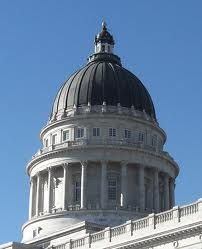
Utah House Republicans are “very hesitant” to vote on any Medicaid expansion plan in a summer or fall special session, leaders said Wednesday.
That includes GOP Gov. Gary Herbert’s “Healthy Utah” – his tailor-made Medicaid expansion program that the governor is now trying to get federal officials to accept.
Herbert has said he wants to call a special session after federal health officials give Utah desired exemptions, and hopefully a bloc grant of around $200 million.
House Speaker Becky Lockhart, R-Provo, speaking at an impromptu press conference Wednesday afternoon -- held after an open House GOP caucus meeting -- said: “We are not ready to make a decision on any plan.”
Pressed by reporters on whether GOP lawmakers could spend several weeks, or even months, studying “Healthy Utah” after anticipated federal exemptions, Lockhart said to do so would take away valuable interim study time.
Anyway, she added, it is best not to make “an almost permanent” decision on a Medicaid plan that could cost Utah taxpayers tens of millions, or even hundreds of millions, of dollars in an afternoon special session – when it would be better to consider such an important budget issue in the 2015 general session, where all spending proposals can be considered in total.
Herbert’s office did not have an immediate response to legislative Republicans’ desire to put off approving a Medicaid expansion plan until next year.
Senate Republicans also discussed Medicaid expansion in their closed Wednesday caucus.
Senate Majority Leader Ralph Okerlund, R-Monroe, said after the meeting he wouldn’t “preclude” a Medicaid special session later this year.
But he said the issue is so complex it would be better dealt with in the 2015 Legislature, which will start the fourth Monday of the New Year.
Lockhart said she presented her concerns in a Tuesday morning joint leadership meeting between the House and Senate.
She told reporters that she would prefer that senators back up the House’s idea of waiting on a Medicaid solution.
But even if the Senate Republicans decided to back Herbert’s “Healthy Utah” program, House Republicans likely will want to wait until January.
In the open House GOP caucus members viewed a snazzy video prepared by Mark Andrews of the Legislature’s staff.
It outlined the different Medicaid expansion proposals made in the 2014 Legislature, explaining each in quick detail.
That video should be watched online by all interested citizens, said Lockhart, and it will soon be posted on the Legislature’s web site: http://www.le.utah.gov.
In the House caucus, Rep. Jacob Anderegg, R-Lehi, said: “I hesitate to come back (into) a special session on this. I want to think (on the various Medicaid expansion plans) and chew it over.”
House Majority Leader Brad Dee, R-Washington Terrace, added: “As we escalate (Medicaid spending) I’m very hesitant. I wouldn’t want to force (any solution) on this body and ask in an afternoon (special session) to make this decision.”
Herbert says he is well on his way to getting federal exemptions – hopefully a bloc grant – to fund Medicaid expansion for lower-income Utahns that make up to 135 percent of the federal poverty level.
With the approximately $200 million annually, Utah would create its own Medicaid expansion system – called “Healthy Utah” -- which Herbert believes can be run more efficiently than just accepting the federal government’s Obamacare Medicaid expansion program.
At the start of the 2014 Legislature, Lockhart assigned two caucus members to study Medicaid expansion. And they came back late in the 45-day general session to suggest that Utah take NO federal Medicaid expansion money at all.
The state is eligible for more than $400 million a year in federal expansion funds, and a number of faith-based and civic groups have lobbied Herbert to take all of it to help provide health care to Utah’s lower-income populace.
Around 150,000 Utahns would be helped by Medicaid expansion, officials believe.
Instead of taking any federal money, House Republicans looked at spending around $35 million a year in state tax dollars to pay for a much scaled down Medicaid expansion effort.
Around 50,000 Utahns would be helped, with the other encouraged to buy subsidized private health insurance packages.
But the idea of spending state tax dollars – and take no federal money – didn’t sit well with Herbert and GOP senators.
Nothing was done on Medicaid expansion in the 2014 session, with Herbert saying he would strongly lobby Washington to give Utah the needed exemptions and flexibility.
Herbert said he would call a legislative special session some time this summer – assuming the exemptions are awarded – and push his “Healthy Utah” expansion alternative.
But if House Republicans decide in a bloc not to support “Healthy Utah,” it is unclear what a special session would accomplish.
Under the Utah Constitution, only the governor can call lawmakers into a special session. And only the governor can set the session agenda.
Lockhart is retiring this year and is looking to run for governor in 2016 – even challenging Herbert inside the Republican Party if he seeks a third term.
In opening 2014 legislative remarks, Lockhart specifically challenged Herbert’s Medicaid plan, saying taking any federal funds was a scam and a fraud.
The pair has dueled back and forth over a number of issues since, with Lockhart telling a fund-
raising/comedy event for Democratic Salt Lake County Mayor Ben McAdams last month that come 2016 she may start using a teleprompter in her speeches, because that is what governors do.
Lockhart said there is “significant concern” about Medicaid expansion’s impact on the overall state budget.
“We believe we can find a unique Utah solution” to Medicaid expansion, said Okerlund.
“And it would be difficult to do that in a one day special session. It could only be accomplished if all the homework was done and everyone was behind one solution.”
Certainly no one has that consensus on any plan now, Okerlund added.